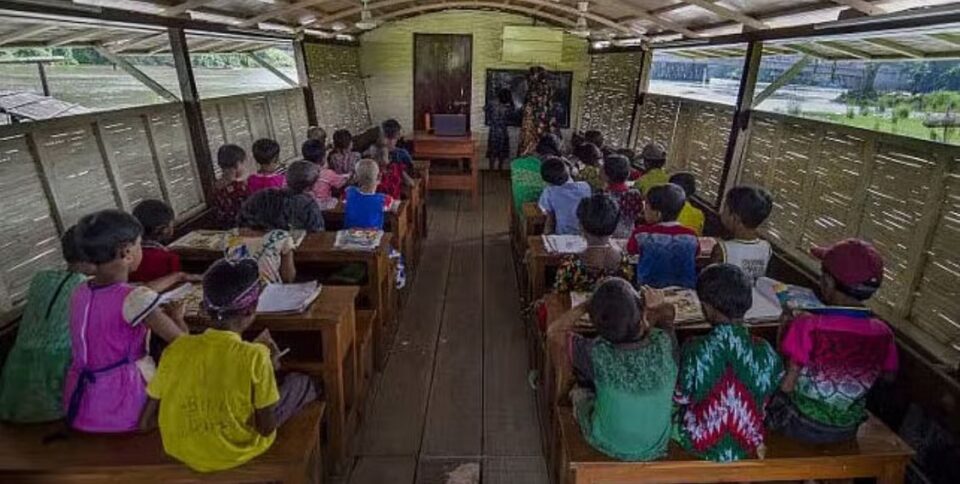BHANGURA (Bangladesh), Oct 7 — In the flood-prone wetlands of Bangladesh, a fleet of solar-powered floating schools is making sure that children like 10-year-old Safikul Islam never miss class — even when their villages are underwater.
Each morning, Islam waits on the edge of his flooded village in Bhangura, western Bangladesh, for a boat that doubles as a classroom. The wooden vessel glides across the submerged landscape, powered by solar panels, bringing education directly to children cut off by rising waters.
His home lies in Chalan Beel, a 26-square-kilometre wetland where seasonal floods routinely submerge roads and homes. But here, education quite literally floats.
The initiative began in 2002, when architect Mohammed Rezwan used $500 of his scholarship money to build the first “floating school.” His vision grew into a national model under the non-profit Shidhulai Swanirvar Sangstha (SSS). Today, the project runs over 100 boats that serve as schools, libraries, and floating clinics, reaching some of the country’s most isolated communities.
This year, the program won the UNESCO Confucius Prize for Literacy for its groundbreaking work in education and community resilience.
“In Chalan Beel alone, 26 of our boats operate as classrooms, visiting riverside villages six days a week,” said Madhusudan Karmaker, a senior manager at SSS. “We currently have 2,240 pupils enrolled, and more than 22,500 students have graduated. During severe floods, these same boats also serve as shelters for displaced families.”
Built from local timber, the boats are fitted with benches, blackboards, and bookshelves, while solar panels power lights and computers. Classes are conducted in three daily shifts, each lasting around three hours, covering Bengali, mathematics, and general knowledge. Teachers navigate the waterways themselves, ensuring no student is left behind.
“We never had the chance to study,” said Sufia Khatun, a mother waiting by the riverbank for her son’s return. “But this boat lets my children dream of a better future.”
Teacher Sakhina Khatun, who has worked with SSS for over a decade, said similar projects have since been replicated in Nigeria, Cambodia, and the Philippines. “These schools never close — not even during floods,” she said. “That’s what makes them special.”
Rezwan, who is also a World Fellow at Yale University, said the project is about much more than boats or classrooms. “I didn’t have many opportunities growing up, and neither do these children,” he said. “But giving them access to education and healthcare — and seeing that model spread across the world — that’s what keeps me going.”

